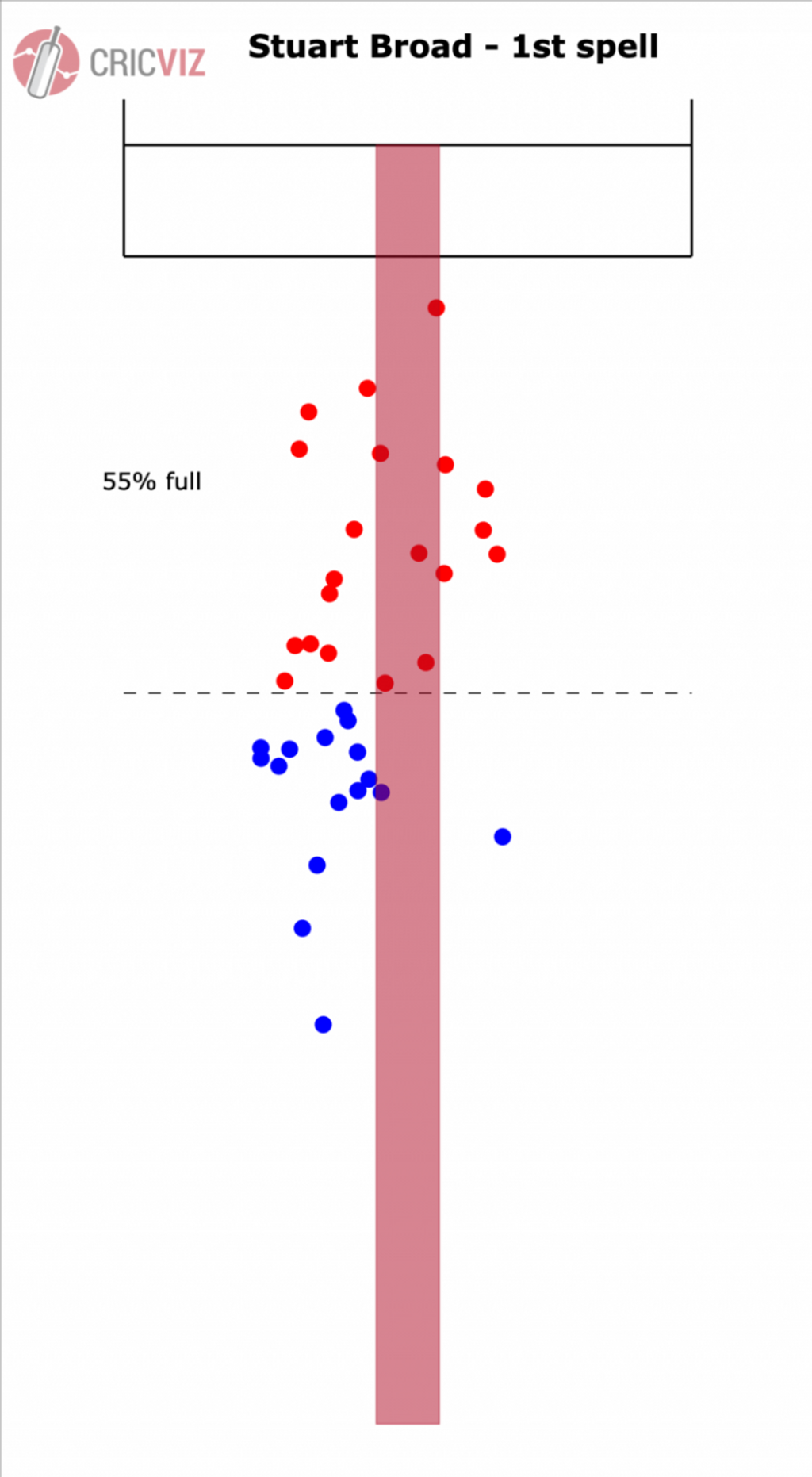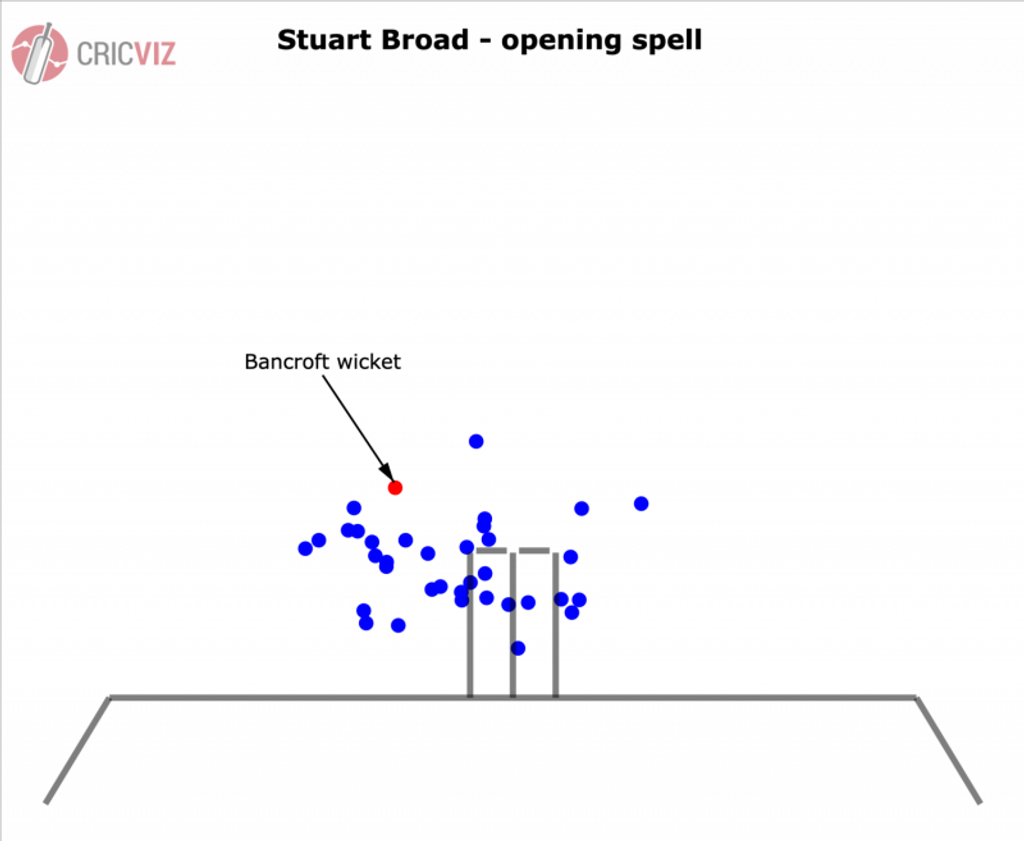
It was Steve Smith’s day as the Ashes got underway at Edgbaston, but not before Stuart Broad showed a glimpse of what might have been for England.
Patrick Noone is an analyst at CricViz.
It seems remarkable to think that there were some calls for Stuart Broad to be dropped for this Test match. Hindsight is a wonderful thing, of course, but even allowing for that, this is Broad’s stage. It always has been.
The first morning of an Ashes series with a fervently partisan home crowd barracking for him is where Broad belongs, the kind of situation he’s thrived in before and made some of the most stunning contributions of his career. Today was no different.
Wicket 1.#ENGvAUSpic.twitter.com/L2zhaNxojK
— Wisden (@WisdenCricket) August 1, 2019
It’s become a familiar refrain in recent years that Broad does not bowl full enough at the start of the innings. There have been countless occasions when he has been accused of ‘wasting’ the new ball by bowling too short. Often that criticism has been fair, other times it has not – there is the strong counter-argument that a guy with over 400 Test wickets to his name must have some idea of what length to bowl.
The narrative has nonetheless persisted, but Broad will have silenced a few of those naysayers today. His average length with the new ball spell was 5.6m from the batsman’s stumps, fuller than he’s been since the first innings of the 2014 Sydney Test and the third fullest opening spell of his career.
Coincidentally, that innings was also the last time he dismissed David Warner in a Test match, having subsequently bowled in 16 innings across three series without taking the wicket of Australia’s returning opener.
Broad should have had his man with his very first ball, but Aleem Dar committed the first of several umpiring mistakes when he failed to spot an inside edge as Warner tried to work to leg. It was the second fullest ball Broad bowled all day – the only one fuller was the very next ball and a tone was immediately set that put England in the driving seat in the early exchanges.

A form of justice prevailed in Broad’s second over when Warner was wrongly given out lbw, even though replays showed the ball was missing leg-stump. A raucous Edgbaston crowd erupted with its first almighty roar of the day, leaving their feelings towards the Australian opener in little doubt and Broad’s Ashes were underway.
However, it wasn’t just about the length that Broad was bowling that caused Australia problems. His average speed during his first six overs was 138.92kph, quicker than he’s been with the new ball in a home Test since 2014. The last time he was as quick as this during an opening spell, Alastair Cook was still England’s ODI captain, Gary Ballance was scoring 156 in a Test match and Steve Smith only had four Test hundreds to his name.
Yet it was perhaps ironic while Broad was fuller and quicker than he’s been for a while, that his next wicket would come from one of the slowest, shortest balls of the spell. At 135.76kph, it was the fourth slowest ball Broad bowled, but that’s still quicker than his average speed since the start of 2018 (134.88kph). Cameron Bancroft went fishing outside his off-stump and Broad, lifted once against by the Edgbaston roar, wheeled away in celebration.

At that stage, Australia were 17-2 and it looked as though ‘Edgbaston 2019’ would be added to ‘The Oval 2009, Chester-le-Street 2013, Trent Bridge 2015’ in the list of Broad’s memorable Ashes demolition jobs. However, Bancroft’s wicket meant that Steve Smith came to the crease to a cacophony of boos and played one of the all-time great innings to blunt Broad’s charge.
While wickets fell around Smith, the former captain remained resolute and Broad’s performance came to embody England’s day as a whole; full of verve in the early stages before becoming gradually more sluggish, shorter of ideas and inspiration as Smith ground them down. With each spell he bowled, Broad’s speed fell as his economy rate rose.

In Broad’s defence, he caused more problems than the rest of England’s attack, drawing a false shot from 19 per cent of the balls he bowled to Smith during his Herculean effort with the bat. He would eventually end the pain for England, bowling Smith for 144 and thus dismissing him for the seventh time in Tests, more than any other bowler. Scant consolation after Smith had stolen the limelight, perhaps, but it was a pleasing way for Broad to bookend the day – drawing first blood in the morning, having the final word in the evening.

When Broad has time to reflect, he might well appreciate the neat parallel of what Smith achieved today. Back in 2013, it was he who took to the field on the first day of an Ashes series as the visiting player in the crosshairs of a partisan home crowd. Having stood his ground at Trent Bridge after edging to slip in the home series that preceded England’s tour Down Under, Broad was public enemy number one in the eyes of the Brisbane faithful as the teams locked horns again.
With the boos and abuse ringing in his ears, Broad responded that day with five wickets, including all of Australia’s top four batsmen. He kept his side in the game they would otherwise have been out of, much as Smith did for Australia today in the face of relentless heckling from the increasingly vocal Hollies Stand. Broad will hope the parallels continue, the outcome of this series is the reverse of that ill-fated 2013/14 tour and he has the last laugh. But whatever happens over the course of the rest of this Test, the 33-year-old medium pacer has given Australia a timely reminder that his days of defining Ashes battles are far from over.








